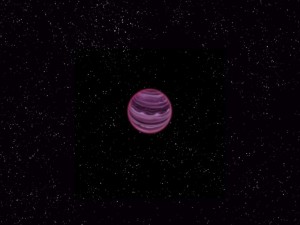Newborn planet floating alone in outer space

This image obtained Oct. 9, 2013, courtesy of MPIA/V. Ch. Quetz shows an artist’s conception of the planet PSO J318.5-22 in the constellation of Capricornus. Astronomers said they have found a lonely planet outside the solar system floating alone in space and not orbiting a star. AFP PHOTO/MPIA/V. Ch. Quetz
WASHINGTON—Astronomers have found a lonely planet outside the solar system floating alone in space and not orbiting a star.
The gaseous, free-floating planet—dubbed PSO J318.5-22—is just 80 light years from Earth and has a mass only six times that of Jupiter.
Having been formed 12 million years ago, the planet is considered a newborn among its peers.
“We have never before seen an object free-floating in space that looks like this,” research team leader Michael Liu of Institute for Astronomy at the University of Hawaii at Manoa said on Wednesday.
“It has all the characteristics of young planets found around other stars, but it is drifting out there all alone … I had often wondered if such solitary objects exist, and now we know they do.”
The researchers, whose study was published in the Astrophysical Journal Letters, identified the planet from its faint and unique heat signature using the Pan-STARRS 1 wide-field survey telescope on the Haleakala volcano of Hawaii’s Maui island.
They suggested the newly found planet may have the lowest mass of all known freely floating objects.
Other telescopes in Hawaii showed that the planet has similar properties to those of gas giants orbiting around young stars, but PSO J318.5-22 lacks a host star.
During the past decade, researchers have found about a thousand extrasolar planets using indirect methods, including planet-induced wobbling or dimming of their host stars.
But only a handful of these planets have been observed directly since most are orbiting around young stars less than 200 million years old and thus very bright.
PSO J318.5-22 “is going to provide a wonderful view into the inner workings of gas-giant planets like Jupiter shortly after their birth,” said coauthor Niall Deacon of Max Planck Institute for Astronomy in Germany.
Deacon said: “Planets found by direct imaging are incredibly hard to study, since they are right next to their much brighter host stars. PSO J318.5-22 is not orbiting a star so it will be much easier for us to study.”
A University of Hawaii press statement said the PSO J318.5-22 was discovered during a search for failed stars known as “brown dwarfs.”
It said that due to their relatively cool temperatures, brown dwarfs are very faint and have very red colors.
To circumvent these difficulties, Liu and his colleagues had been mining the data from a telescope which scans the sky every night with a sensitive camera.
“PSO J318.5-22 stood out as an oddball, redder than even the reddest known brown dwarfs,” the statement said.
Dr. Eugene Magnier, a coauthor of the study, said: “We often describe looking for rare celestial objects as akin to searching for a needle in a haystack. So we decided to search the biggest haystack that exists in astronomy.”
The team found that PSO J318.5-22 was not a brown dwarf.
The team said it directly measured the star’s distance from Earth and based on this distance and its motion through space, it concluded that PSO J318.5-22 “belongs to a collection of young stars that formed about 12 million years ago”—relatively young in cosmic age.—Reports from AFP and Inquirer Research
